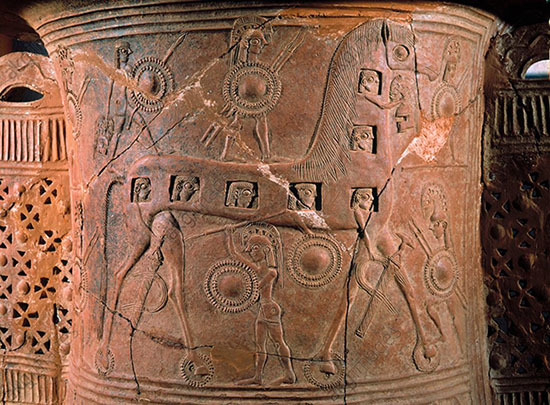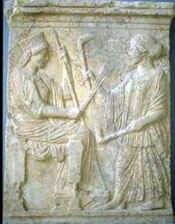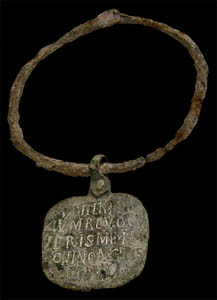Classics Courses 2017-18
CLA 1-372 Epic Tradition: Singer of Tales

The Greeks hiding inside the Trojan horse. Amphora. c. 670 BCE. Mykonos Archaeological Museum.
Think of this course as an introduction to World Mythology. How do different cultures define what it means to be a hero? How does he excel? What qualities does he demonstrate? How does he create a gendered, cultural identity that others admire (or not)? What role do the gods play? And how does each narrative depict the other side? Beginning with Homer's Iliad, we will explore five great epic poems from five different cultures from five different eras: 8th century BCE Greece (The Iliad), 1st century Rome (The Aeneid), 12th century France (The Song of Roland), 20th century West Africa (Sunjata), and the late 20th century Caribbean (Derek Walcott’s Omeros). This course is a great way to become familiar with world mythology, oral poetry, and five stirring narratives. Taught in English. Prerequisite: Writing-designated course (W). (Humanities) Gruber-Miller

Demeter and Persephone, Apollo and Dionysos, Achilles and Agamemnon, Medea and Alcestis. Names of myth and legend, deception and intrigue, true love and not so true love.
Study of the development of the myth, legend, and folklore of the ancient world, especially its place in ancient Greek and Roman culture, and its survival in the modern world.
Sample Syllabus for Classical Mythology
CLA 4-254 Greek History
 The Trireme Olympias, a modern reconstruction of the Greek warship that helped to defeat the Persians at the Battle of Salamis
The Trireme Olympias, a modern reconstruction of the Greek warship that helped to defeat the Persians at the Battle of Salamis
This in an introductory course in Greek history that will cover major social, economic, and political developments from the Archaic period in Greece to the rise of Alexander the Great. Topics to be discussed include the formation of city states, Athenian Democracy, war with Persia, the Peloponnesian War and the coming of the Hellenistic Age. (Humanities) Venticinque
CLA 8-375 The Ancient Economy
 Roman slave collar
Roman slave collar
The economy of the Greek and Roman world has been called an "academic battleground," a description of the debate that proves less fitting today than it did several decades ago when Keith Hopkins coined the phrase. Since 1973, much of the battle has been waged in defense of or in opposition to Moses I. Finley's groundbreaking work, The Ancient Economy. This course will provide not only an introduction to the economy and society of the ancient world by examining agriculture, craft production, labor, and trade based on documentary evidence and literary texts and documentary evidence, but also will include a consideration of the formal and informal constraints on these activities, namely ideology, status concerns, and law. Finley's work - along with the responses of both supporters and his critics - will guide and inform the class discussion in order to provide students with the necessary tools to evaluate current debates and offer their own examination of the work and activities carried out by craftsmen, merchants, farmers, and the landowning elite. (Humanities) Venticinque
